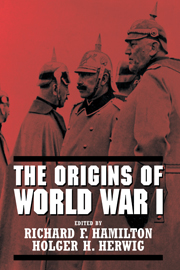Book contents
- Frontmatter
- Contents
- List of Tables and Maps
- Contributors
- Acknowledgments
- 1 World Wars: Definition and Causes
- 2 The European Wars: 1815–1914
- 3 Serbia
- 4 Austria-Hungary
- 5 Germany
- 6 Russia
- 7 France
- 8 Great Britain
- 9 Japan
- 10 The Ottoman Empire
- 11 Italy
- 12 Bulgaria, Romania, and Greece
- 13 The United States
- 14 Why Did It Happen?
- 15 On the Origins of the Catastrophe
- Appendix A Chronology, 1914
- Appendix B Dramatis Personae
- Appendix C Suggested Readings
- Index
7 - France
Published online by Cambridge University Press: 05 August 2012
- Frontmatter
- Contents
- List of Tables and Maps
- Contributors
- Acknowledgments
- 1 World Wars: Definition and Causes
- 2 The European Wars: 1815–1914
- 3 Serbia
- 4 Austria-Hungary
- 5 Germany
- 6 Russia
- 7 France
- 8 Great Britain
- 9 Japan
- 10 The Ottoman Empire
- 11 Italy
- 12 Bulgaria, Romania, and Greece
- 13 The United States
- 14 Why Did It Happen?
- 15 On the Origins of the Catastrophe
- Appendix A Chronology, 1914
- Appendix B Dramatis Personae
- Appendix C Suggested Readings
- Index
Summary
Introduction
France had a central role in the origins of the First World War. A long-standing hostility toward Germany led to the Dual Alliance with Russia and the entente cordiale with England, these providing the framework for Germany's diplomatic isolation. The two Moroccan crises brought serious strains and more nationalist rhetoric that exacerbated international tensions. After 1911, as war seemed more and more likely, French financial support for a massive Russian military program to be completed in 1917 gave Germany's military leaders reason to fight sooner rather than later. In the immediate crisis of July 1914, with French support assured, Russia mobilized against the Central Powers, Germany declared war, and an Austro-Serbian conflict turned into European war.
These many French contributions notwithstanding, numerous studies of the events of 1914 have portrayed France as a minor player. The most important role attributed to France is a supposed inciting of Russia to war against Austria-Hungary, this appearing in works intended to exonerate Germany. More often, France takes the stage as the incidental victim of German war plans against Russia. Yet another version of the script ignores France in favor of her partner in Western Europe's military affairs. Great Britain, not France, should have prevented war by creating an army capable of rapid intervention on the Continent and by advertising her willingness to defend neutral Belgium.
- Type
- Chapter
- Information
- The Origins of World War I , pp. 227 - 265Publisher: Cambridge University PressPrint publication year: 2003
- 1
- Cited by



